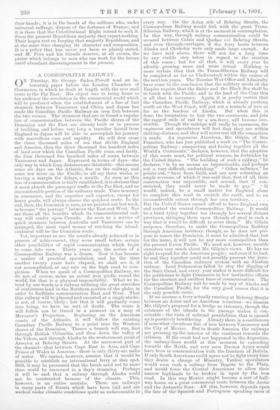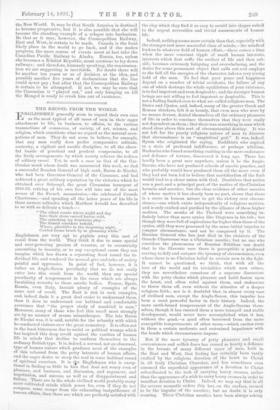A COSMOPOLITAN RAILWAY.
ON Tuesday, Sir George Baden-Powell read an in- teresting paper before the London Chamber of Commerce, in which he dealt at length with the new mail route to the Far East. His object was to bring home to his audience the revolution in the commercial world which will be produced when the establishment of a line of fast steamers between Vancouver and China and Japan has made the Canadian Pacific Railway an iron link between the two oceans. The steamers that are to found a regular line of communication between the Pacific shores of the Dominion and the East aro already built or in process of building, and before very long a traveller bound from England to Japan will be able to accomplish his journey with marvellous ease and rapidity. He will first cross the three thousand miles of sea that divide England and America, then the three thousand five hundred miles of land over which the Canadian Pacific runs, and lastly, the four thousand five hundred miles of ocean between Vancouver and Japan. Expressed in terms of days—the only way in which long distances are thinkable—this means some six days on the Atlantic, five on the railway, and some ten more on the Pacific, in all say three weeks, or leaving a margin for delays, a month. As soon as this line of communication is fairly established, it is obvious that it must absorb the passenger traffic to the Far East, and no inconsiderable portion of the ordinary trade. Time is money in commerce, and the importer and exporter, except for heavy goods, will always choose the quickest route. In the end, then, the Dominion is sure, as we pointed out last week, to become " the portage " between the East and West. Nor are these all the benefits which its transcontinental rail- way will confer upon Canada. As soon as a service of quick steamers between Australia and Vancouver can be arranged, the most rapid means of reaching the island- continent will be the Dominion route.
Yet, important as are the results already achieved or in process of achievement, they seem small before certain other possibilities of rapid communication which begin to come into view. Thirty years ago, the notion of a Cosmopolitan Railway was a dream. Now it has become a matter of practical speculation, and by the time another twenty years have elapsed, we shall see it, if not accomplished, at any rate on the high road to com- pletion. When we speak of a Cosmopolitan Railway, we do not, of course, mean an actual iron girdle round the world, for that is a physical impossibility. What we in- tend by our words is a railway utilising the great stretches of continuous land in the Northern portion of the globe, in order to facilitate communication East and West. That this railway will be planned and executed at a single stroke, is not, of course, likely ; but that it will gradually come into being, we have no sort of doubt. The route it will follow can be traced in a moment on a map of Mercator's Projection. Beginning on the American coasts of the Atlantic, it will follow the existing Canadian Pacific Railway to a point near the Western shores of the Dominion. Thence a branch will run, first through British Columbia, and then down the valley of the Yakon, and through Alaska to the westernmost point of America at Behring Straits. At the narrowest part of the channel—that between Cape East in Asia, and Cape Prince of Wales in America—there is only thirty-six miles of water. We cannot, however, assume that it would be possible to establish an international ferry at this spot. Still, it may be presumed that the break need not be more than could be traversed in a day's steaming. Perhaps it will be said that a railway through Alaska could not be constructed because of the climate. This, however, is an entire mistake. There are railways in many parts of Russia which have been laid and are worked under climatic conditions quite as unfavourable in every way. On the Asian side of Behring Straits, the Cosmopolitan Railway would link with the great Trans- Siberian Railway, which is at the moment in contemplation. In this way, through railway communication could be secured between Calais and Quebec via Behring Straits, and even through-carriages, if the ferry boats between Alaska and Chukchis were only made large enough.. As we have said above, there will not for a long time be any visible step taken in regard to the creation of this route ; but for all that, it will every year be silently growing more and more actual. Nothing is more certain than that the Trans-Siberian Railway will be completed as far as Vladivostock within the course of the next ten years. Tho Russian War Office and Admiralty have come to the conclusion that the military needs of the Empire require that the Baltic and the Black Sea shall be in touch with the Pacific, and in the land of the Czar this is all that is necessary. Again, it is pretty certain that the Canadian Pacific Railway, which is already pushing north on the West Coast, will put out a tentacle of iron as far as the borders of Alaska. But when this is done, the temptation to link the two continents, and join the ragged. ends of rail by a sea-ferry, will become irre- sistible. Though the mileage will really be enormous, the engineers and speculators will feel that they are within striking-distance, and they will never rest till the connection is made. An ingenious American, Mr. Gilpin, of San Francisco, who has just published a work on " The Cosmo- politan Railway : compacting and fusing together all the World's Continents," declares, however, that the adoption of this route must, for political reasons, be forbidden by the United States. " The building of such a railway," he declares, " is by no means an impracticable, and perhaps not a very difficult, undertaking." "Other railways," he points out, " have been built, and are now returning an ample revenue, of which it was said that, first of all, their construction was impossible, and second, that if con- structed, they could never be made to pay." ," It would, indeed, be a small matter for England alone to complete this road to encircle the earth, and to no inconsiderable extent through her own territory But the United States cannot afford to have England own and control the central Cosmopolitan Railway. It would be a band tying together too strongly her several distant provinces, stringing them upon threads of steel in such a way that it would be difficult to sever them." Mr. Gilpin proposes, therefore, to make the Cosmopolitan Railway through American territory, though, as he does not pro- pose to annex the Dominion, it must be admitted that, but for the name, it will not be any more cosmopolitan than the present Union Pacific. We need not, however, trouble ourselves very much about Mr. Gilpin's views. He has no right to speak for the American people ; and even if he had, he and they together could not possibly prevent the junc- tion of the Canadian railways system with an Alaskan railway. Lord Palmerston failed to stop the digging of the Suez Canal, and every year makes it more difficult for the politicians to fight Commerce in her instinctive efforts for the shortest and swiftest lines of communication. The Cosmopolitan Railway will be made by way of Alaska and the Canadian Pacific, for the very good reason that it is the only possible route. If we assume a ferry actually running at Behring Straits between an Asian and an American terminus—we dismiss Mr. Gilpin's proposal for a bridge as visionary, though the existence of the islands in the passage makes it con- ceivable—the vista of railroad. possibilities that is opened. up is positively bewildering. Already there is a continuous if somewhat circuitous line of iron between Vancouver and the City of Mexico. But-in South America the railways are pressing up the interior of the continent towards the isthmus. If the crash had not happened in the Argentine, the railway-lines would at this moment be extending towards the North, and very soon Buenos Ayres would have been in communication with the frontiers of Bolivia. If only South Americans could. agree not to fight every time they desire a change of Ministry, Yankee speculators would soon rush a railway from Bogota to the Plate, and would force the Central Americans to allow their narrow highlands to be broken in upon by the iron road. In this way Mexico might become a sort of half- way house on a great commercial route between the Arctic and the Antarctic Seas. All this, however, depends upon the fate of the Spanish and Portuguese speaking races of the New World. It may be that South America is destined to become progressive, but it is also possible that she will become the standing example of a relapse into barbarism. Be that as it may, however, the Cosmopolitan Railway, East and West, is certain to be made. Canada is the least likely place in the world to go back, and if she makes progress, the mere course of events must at last take the Canadian Pacific Railway to Alaska. Russia, too, unless she becomes a Nihilist Republic, must continue to lay down railways ; and therefore, humanly speaking, the consumma- tion we are suggesting is inevitable. No doubt there will be another ten years or so of derision at the idea, and possibly another five years of declarations that the line could never pay ; but after that the Cosmopolitan Railway is certain to be attempted. If not, we may be sure that the Caucasian is " played out," and only hanging on till the Mongol is ready to crush him out of existence.



































 Previous page
Previous page